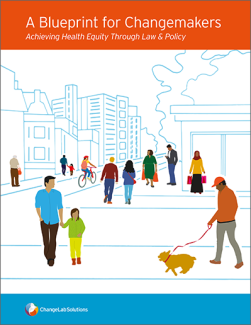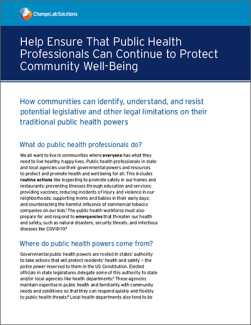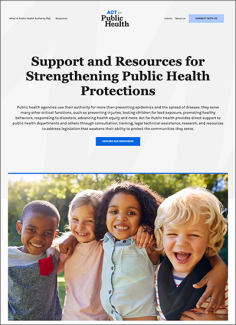By Sarah de Guia, JD
If you’d like to learn more about public health advocacy and lobbying, register for Sarah’s November 13 APHA session Advocacy in the Current Political Climate or watch ChangeLab Solutions’ presentation Public Health Advocacy: The Basics.
Rapidly Growing Interest in Advocacy & Lobbying
“I work in public health, and I want to help change our system. Please tell me about advocacy and lobbying.” For the past year, my colleagues and I have received numerous requests like this from public health practitioners around the country. Speaking about this topic has been both exhilarating — it’s what I’ve spent the greater part of my career doing — and daunting, because I see how much fear and misunderstanding people have about advocacy in public health. Mostly, I am optimistic about the impact we can make if more of us engage in public health advocacy.
At ChangeLab Solutions, we believe that law and policy have the greatest potential to dismantle structural inequities. Law and policy affect our health in many ways, from allocating resources for programs and services to determining who is (and isn’t) eligible. Governmental public health plays an essential role in law and policy, even if we have been discouraged from thinking so or scared into believing otherwise. Our Blueprint for Changemakers and recently released companion guide and web tool highlight the potential of law and policy to address pervasive health disparities when we replace inequitable policies with policies that advance health and equity. In recent years, public health leaders have increasingly recognized the value of law and policy in improving population health — for example, in the revised 10 essential public health services framework.
Protecting Public Health
Public health focuses on keeping everyone safe and healthy, and public health practitioners have the opportunity to greatly improve health outcomes for communities that have traditionally been marginalized or excluded. We don’t often think about the many ways in which public health practitioners work to keep us safe. Their work includes responding to infectious disease outbreaks, keeping restaurants in compliance with health and safety codes, ensuring that hospitals and nursing facilities are up to code, and providing data to local governments to guide programs.
However, since the COVID-19 pandemic, many groups have made efforts to discredit and attack public health officials and public health departments, preventing them from protecting our health. These efforts are in addition to efforts by corporate special interests and conservative policymakers to use preemption — a legal doctrine in which a higher level of government may limit or even eliminate the power of a lower level of government to regulate a specific issue — to stop local governments from adopting policies that have been proven to improve health and well-being. In order to better understand the drivers of health inequity as well as the health effects of this backlash, researchers have been tracking various health conditions — including rising mortality rates, poverty rates, and other factors — across states that are proactively addressing the drivers of health inequity versus states that are not. Their findings show a connection between life expectancy and whether a state is enacting supportive policies like Medicaid, minimum wage, earned income tax credits, and paid leave. One legal scholar, Jennifer Karas Montez, observes that states that have preempted health-promoting policies generally have lower life expectancies and have made the smallest gains in life expectancy in recent decades.
Public health practitioners’ interest in advocacy and lobbying couldn’t come at a better time. We need more advocates for public health because many health inequities and disparities are worsening; US life expectancy is dropping; misinformation and disinformation about public health abound; and our public health institutions and leaders are under attack.
Demystifying the Primary Components of Lobbying
Many people are confused about what lobbying is and who can lobby. Lobbying is engaging in certain activities with the goal of influencing pending legislation either directly or by mobilizing others. Many of the restrictions on lobbying are defined in regulations of the Internal Revenue Service, philanthropic contracts, and government grants or contracts, which typically restrict the type of funding that can be used to fund staff time for lobbying. State or local laws may impose additional restrictions. Broadly, for an activity to be considered direct lobbying, four elements must be in place: there must be (1) a communication (e.g., a letter, call, Instagram post, or tweet) (2) with a government official or their staff, (3) attempting to influence (i.e., asking them to support or oppose) (4) specific legislation (active legislation, which includes budget bills). Some federal contracts or grants restrict activities related to rulemaking as well as legislation. If one of these elements is missing, the activity isn’t lobbying and is likely free from restrictions.
Private individuals and residents who want to weigh in on policies or contact local, state, or federal representatives can do so on their own personal time and in their personal capacity. Government employees should be mindful of separating their work and personal affiliations when engaging in lobbying and should weigh the political considerations before engaging in lobbying activities.
Advocacy: Ensuring That Policy Is Equitable & Community-Centered
Advocacy — getting involved in government and policymaking — has the power to influence public policy for the better. Moreover, research indicates that this type of civic engagement is good for our health. When people engage in advocacy and decision-making processes, policies are better crafted, better implemented, and better address community needs. There are many ways to engage in policymaking that are not lobbying:
- Coalition building. Organizations or agencies can bring together diverse stakeholders to discuss challenges, problems, and solutions. ChangeLab Solutions is one of several public health law organizations that coalesced to create Act for Public Health, an initiative that tracks efforts and provides technical assistance to prevent rollbacks of public health authority. While Act for Public Health has provided some guidance on specific legislation that would constitute lobbying, the majority of its activities are not lobbying.
- Performing nonpartisan analysis, study, or research. Researchers, agencies, or community organizations can prepare reports that explore problems and potential solutions. Information should be (1) independent and balanced, allowing readers to come to their own conclusions; (2) based on evidence and facts; and (3) broadly distributed to the public. ChangeLab’s strategy brief Advancing Racial Equity in Rural Communities is an example of this type of research report; it highlights challenges, opportunities, and policy solutions that are supported by data, evidence, and community partners.
- Creating model policies or laws. Model policies express a vision and provide an example of laws or policies that could be adopted. ChangeLab has created many types of model policies that leave it to the government entity’s discretion as to which portions to adopt. For example, here is ChangeLab Solutions’ Model Ordinance on Proactive Rental Inspection.
- Sharing stories and successes. Stories about successes and challenges in policymaking provide an opportunity to share what is working and offer examples of solutions without a call to action. A series of videos, stories, and local profiles from the Housing Solutions Collaborative illustrates the power of examples and success stories to inspire action.
Governmental Public Health’s Foundational Roles in Policymaking
Governmental public health includes federal, state, and local government agencies that carry out public health activities. These government agencies should model the centering of equity and should advocate for the people who have traditionally been most marginalized in the processes of policy design and implementation. Even when it’s not the leader of an initiative, governmental public health can practice equitable decision making in these additional ways:
- Convening. Governmental public health agencies are powerful conveners, able to connect with various governmental and nongovernmental partners. An impactful way to center equity is by bringing together interested parties, including community organizations and leaders, to identify and assess opportunities, challenges, and resources for making change. For an example of effective convening of partners, read about ChangeLab Solutions’ work with The BUILD Health Challenge. You can also review our Policy Process Evaluation for Equity guide and online tool for ideas on how to assess the effects of convening and engaging community members to promote health in equitable ways.
- Supporting. Governmental public health doesn’t need to be the leader on every issue; sometimes other partners or advocates are best suited to lead an initiative. Governmental public health can amplify those initiatives by speaking up and proactively supporting their partners. For examples of public health work in which community members and organizations took a leading role, read about Health Equity Zones in Rhode Island, or review a 2021 report co-authored by ChangeLab Solutions on how governments can better partner with community-based organizations.
- Enforcing. Public health laws and policies need compliance in order to be effective; however, policies that are overenforced or underenforced can lead to inequities. ChangeLab Solutions’ equitable enforcement guide offers important perspectives and alternative methods of enforcement that governmental public health can use to center community health and equity.
Speak Up, Take Action!
As public health practitioners, we have an important role in advancing systemic change, not just individual change. It is imperative that we speak up, take action, and collaborate to support laws and policies that create healthy environments. In particular, public health practitioners need to learn about, understand, and actively dismantle historical inequities that play a role in creating and reinforcing health disparities. ChangeLab’s Blueprint for Changemakers and companion web tool are the perfect starting point for understanding the drivers of health inequity and acting to address them. And if your state is contemplating rollbacks of public health authority, connect with ChangeLab Solutions and our partners for assistance. The time to get engaged is now. Speak up and take action today!
11/8/2023


